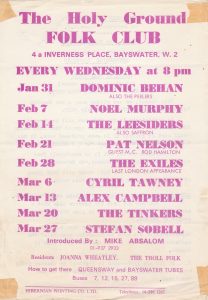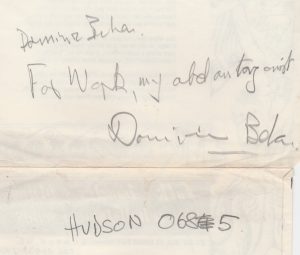MORE STORIES FROM THE HANGING LAMP
RADIO 2
Frances Line, the Producer of Folk on Two on BBC Radio 2 invited me to Bush House in The Strand in London. We recorded Hunter Muskett’s Every Time You Move. I cant pretend I was not a bit nervous. Apparently, the recordings I made that day counted as my BBC audition as I later received a beautifully worded letter telling me a panel of producers had listened to them and ‘never the less’ I had passed my BBC audition. That was disappointing as most big stars failed theirs.
CAPITAL RADIO, CLIVE JAMES, ZOOT MONEY
Clive James did me a great service one night when I was playing a Capital Radio all nighter. He didn’t talk much!
As a highly intellectual consummate broadcaster, Clive, with his colleague Pete Atkin, could have blown us all away that night but they were very generous. Ian Shircore’s book Loose Canon details that particular evening very well.
The All-Nighters were great fun. They went out live and nobody ever quite knew who might be on. You never quite knew what the participants might do either! Broadcasting pro Sarah Ward hosted my first one: the others were hosted by New Yorker Robbie Barish, a quietly spoken gentle presenter with that after midnight voice that goes down so well with insomniacs.
Sometimes even the presenter didn’t know who would turn up. Guests would often bring along guests – dangerously free flow!
This was an early phone-in programme so we would buckle down to knuckle headed questions too. The most common was ‘What strings do you use?’ and ‘What tuning are you using?’ We were rarely asked about our cravats and smoking jackets.
Sadly, I wasn’t on the programme that caused the programme to come crashing down. That honour belonged to Zoot Money. Some fairly intense language along at a time when you couldn’t say ‘Oh Knickers’ on the air and get away with it. The programme came off the air within minutes.
NOEL MURPHY AND DAVEY JOHNSTONE
One Monday night at the Hanging Lamp, Noel turned up with a young man we didn’t know. With my experience of Hamish Imlach and John Martyn, we were happy to welcome ‘Davey’.
Noel invited me up to add another guitar to his and Davey’s. Noel was standing in the middle, Davey and I either side when he got to the big finish. Noel standing tall and hauling his fret board up over his head crashed out the strip light directly above us. Tiny shards of glass exploded over all three of us, there was chaos and delight in the audience but days of getting glass out of my hair for me. Noel was a bushy haired bloke, Davey and I had long straight blond locks, mine down my chest, Davey’s pretty well to his waist. There was a lot of glass and a lot of hair to hide it in.
There is a legend around that Noel Murphy was a hard man who could eat glass and I wondered if the origin of that was a strip light in a Richmond cellar. But Karina Gabner, a regular at The Lamp and a long term friend of Noel’s reminds me that there really was a story of Noel swallowing glass and a few horrendous weeks followed.
Davey Johnstone disappeared off the scene for a while but reappeared as Elton John’s Musical Director after hitting the world as the guitarist responsible for the famous riff in Rocket Man.
RICHARD HARVEY
Richard was the front man for Gryphon, a group of musical students who specialised in Ye Earlie Musick. We booked them regularly because we thought they were very talented and fun. Richard went on to be a BAFTA award winning composer famous for tv and film soundtracks. On the way he worked with the likes of Richard and Linda Thompson and Ashley Hutchings and he nearly worked with me. He asked me to play on a new album he was writing and I refused (nicely). I didn’t think I was good enough because they were all proper music students and I wasn’t. What a stupid mistake. I never refused anyone else ever again.
RON GEESIN, GORDON GILTRAP
Ian Shircore was not really all that keen on folk music but he was very keen on the music business so in our ‘folk club’ he was always looking for something different. We loved Ron Geesin and the audience were wowed by the speed of Gordon Giltrap. Like Davey Johnstone, Gordon has had a great and mixed career working on his own and with various others like Sir Cliff Richard.
MIKE AND SALLY OLDFIELD
We liked a young duo called the Sallyangie and booked them regularly. They were a brother and sister and really talented in a melodic way. Like Davey Johnstone, they disappeared off the scene too for a while.
It was like that, I suppose, with people finding their way, finding their preferred music style and formation and usually finding their route into the recording business if they were any good.
Sallyangie reappeared as Mike Oldfield and Tubular Bells, one of the seminal albums of the time with multi-layered textures of great tunes.
ELVIS COSTELLO, EWAN McCOLL
I suppose we prided ourselves on encouraging new talent on the folk scene by booking them regularly but we didn’t always get it right.
We missed the Grammy Award winning Elvis Costello! In his autobiography, Unfaithful Music, the young Declan McManus, not yet 15, came to the Lamp on the evening when Ewan McColl was the guest artist. The floor singer Costello says that McColl fell asleep as the young lad played the first song he had ever written ‘Winter’. This was also his first public performance and we should apologise for missing his talent. So, just in case you are avidly reading this, Elvis, sorry about that. To be fair, he was 23 when he released his first and very much welcomed album ’My Aim is True’ . Years later, I played guitar in our friend Pat and Paddy Walsh’s garden in East Twickenham and I accompanied Costello’s father, Ross McManus in a song or two.
DOMINIC BEHAN
 I visited clubs all over London doing floor spots or gigs and checking out talented new performers. We invited the most interesting to the Lamp. One night I was in the Holy Ground in west London. Dominic Behan was the guest. I was pretty naive in terms of politics and saw Dominic only as the writer of some wonderful lyrical melodies. The Holy Ground was a big club and could be noisy. I took Dominic into a quiet corner and asked him if he would like to play the Hanging Lamp but it was all too noisy. In the end I pushed a pen and paper into his hand and asked him for his phone number. ‘For what? He asked. ‘For work, Dominic’, I replied. He wrote ‘For work, my old anatagonist’.
I visited clubs all over London doing floor spots or gigs and checking out talented new performers. We invited the most interesting to the Lamp. One night I was in the Holy Ground in west London. Dominic Behan was the guest. I was pretty naive in terms of politics and saw Dominic only as the writer of some wonderful lyrical melodies. The Holy Ground was a big club and could be noisy. I took Dominic into a quiet corner and asked him if he would like to play the Hanging Lamp but it was all too noisy. In the end I pushed a pen and paper into his hand and asked him for his phone number. ‘For what? He asked. ‘For work, Dominic’, I replied. He wrote ‘For work, my old anatagonist’.
The experience at The Hanging Lamp was good for me and because of it I began to get bookings all over London. Publicity was all (still is of course) but lots of clubs couldn’t really afford a decent fee so in those days it was quite common to do a club for ‘half the money off the door’ and a decent sized advert in the Folk Diary in the Melody Maker.
The Melody Maker was our newspaper. The New Musical Express was for the rock guys.
Every week there was a two page spread for the Folkies with a half page feature on the left and the Folk Forum (the diary) on the right. If your name was in the Forum at pitch 14 bold, people began to notice you mainly because they couldn’t miss you! If you were the feature on the left hand page, you’d pretty well made it. Richard Digance and I eventually made it.
So, there’s a taster of the 100,000 words I’m working on now. I hope that’s been a bit of fun. I won’t be adding any more here and let’s hope that the whole version gets published.
Have fun

